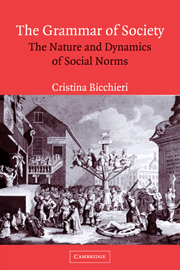4 - Covenants Without Swords
Published online by Cambridge University Press: 05 June 2012
Summary
Introduction
A social dilemma is, by definition, a situation in which each group member gets a higher outcome if she pursues her individual interest, but everyone in the group is better off if all group members further the common interest. Overpopulation, pollution, Medicare, public television, and the depletion of scarce and valuable resources such as energy and fish-rich waters are all examples of situations in which the temptation to defect must be tempered by a concern with the public good. There are several reasons why some individuals might not contribute to the provision of public goods or refrain from wasting common resources. Usually these resources are used by or depend on very large groups of people for their continued maintenance. It is easy, therefore, for an individual to consider her contribution to a public good or her personal consumption of a common resource as insignificant. Furthermore, in social dilemmas there is a huge difference between the costs and benefits accruing to an individual. Gains go to the individual, but the costs are shared by all. Given the structure of social dilemmas, rational, self-interested individuals are predicted to defect always. Yet almost 50 years of experiments on social dilemmas show cooperation rates ranging from 40 to 60%, and everyday experience shows people making voluntary contributions to public goods, giving to charities, volunteering, and refraining from wasting resources.
There is plenty of evidence that most people are conditional cooperators: They cooperate when they expect others to cooperate and defect otherwise.
- Type
- Chapter
- Information
- The Grammar of SocietyThe Nature and Dynamics of Social Norms, pp. 140 - 175Publisher: Cambridge University PressPrint publication year: 2005



